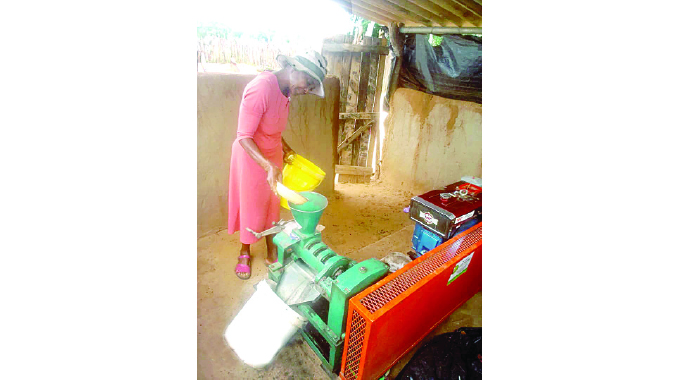The Chronicle

Oliver Kazunga, Senior Reporter
AN enterprising rural farmer in Bubi District, Matabeleland North, is living large from her cooking oil venture that produces 200 litres per day.
 Mrs Florence Mthimkhulu feeds sunflower seed into the oil expresser machine
Mrs Florence Mthimkhulu feeds sunflower seed into the oil expresser machineThe venture is not only benefitting Mrs Florence Mthimkhulu, who is running the project at her homestead with the help of her husband, Mr Paul Mthimkhulu in Ntobi, Ward 5, but villagers in the neighbourhood too.
This summer cropping season, she has entered into a sunflower contract farming arrangement with 30 villagers in the area.
In an interview, Mrs Mthimkhulu said in some parts of the greater dry region of Matabeleland North, particularly Bubi District, some farmers were now taking sunflower farming seriously, providing her operation with feed stock.
“I started this cooking oil expressing project after harvesting last year.
Before venturing into the cooking oil business, I was planting sunflower and selling it to a stockfeed-manufacturing company in Bulawayo.
“In the 2020/21 summer cropping season, I harvested 191 buckets and MELANA (Matabeleland Enhanced Livelihoods, Agriculture and Nutrition Adaptation), a local non-governmental organisation that has been supplying sunflower seed to villagers in the district, came up with a proposal and asked me if I was interested in venturing into cooking oil production as part of empowerment,” Mrs Mthimkhulu said.
The proposal came after she had produced the highest sunflower yield in the district.
Working with the Zimbabwe Resilience Building Fund (ZRBF), MELANA was implementing a number of projects in the Matabeleland region, with the aim of improving resilience to the adverse effects of climate change and livelihoods of people.
Some of their projects include the establishment of a seed bank in Majiji Village in Bubi District to assist the community in preserving high value traditional varieties such as finger millet, sorghum, millet and quinoa.
A seed bank is a special building with flood, bomb and radiation proof vaults used to preserve genetic diversity.
After agreeing to pursuing the cooking oil project proposal, Mrs Mthimkhulu said MELANA helped her acquire a machine that expresses cooking oil from Harare in April last year.
“MELANA paid 70 percent of the US$3 500 total price of the machine and I paid 30 percent, which was US$850.
I then started expressing oil in July last year using feed stock from farmers in my ward and other wards close by.
“Depending on how much sunflower seed we receive from farmers per day, we are able to process one tonne of sunflower.
A tonne of sunflower is a 20l bucket by 100 and each bucket produces 2l of cooking oil,” she said.
Mrs Mthimkhulu is grateful to MELANA for empowering her, saying she was also extending the empowerment project to fellow villagers in the district by encouraging them to grow sunflower and start their own cooking oil processing businesses.
“Since the business is still growing, for now we are processing cooking oil that we only sell within this ward and other nearby wards in the district.
Those who come with their seed for processing pay US$1 for 2l if they leave the sunflower cake and US$1,50 if they take it.
“We have a lot of support, which means we have to be well stocked at any given time.
As the business grows, we are hoping to expand our market into the province at large, supplying various institutions such as schools,” said Mrs Mthimkhulu, who also runs a poultry project.
She said the cooking oil project has transformed her life as they could now afford to send their six children and five from their extended family to school.
“Through the cooking oil project, all my six children and five others from our extended family are all in secondary school in Bulawayo.
I have also managed to build a three-roomed house here from this project,” said Mrs Mthimkhulu.
Her project augers well with the Second Republic’s vision to end rural-to-urban migration that is spawned by a long-held mentality that everything good comes from urban areas.
“I am encouraging people to realise that agriculture can transform their livelihoods through food security and financial empowerment.
As a rural farmer, I urge fellow villagers to always bear in mind that their lives are anchored on tilling the land or livestock production.”
She recently started a poultry project, rearing sasso chickens and sold the first batch of 200 to an organisation in Tsholotsho.
Prior to the cooking oil project, Mrs Mthimkhulu was growing maize and producing between 15 and 18 tonnes every season.
Government has shown commitment to accelerating rural modernisation and industrialisation through agriculture in order to create jobs, improve livelihoods and transform lives of all once marginalised rural communities.
The development thrust is enunciated in the National Development Strategy 1 (NDS1) that has seen life-changing industries being established in some parts of the country.
Agriculture, which remains the mainstay of the country’s economy, grew by 7,8 percent last year; the highest in the region. – @KazungaOliver
Article Source: The Chronicle
